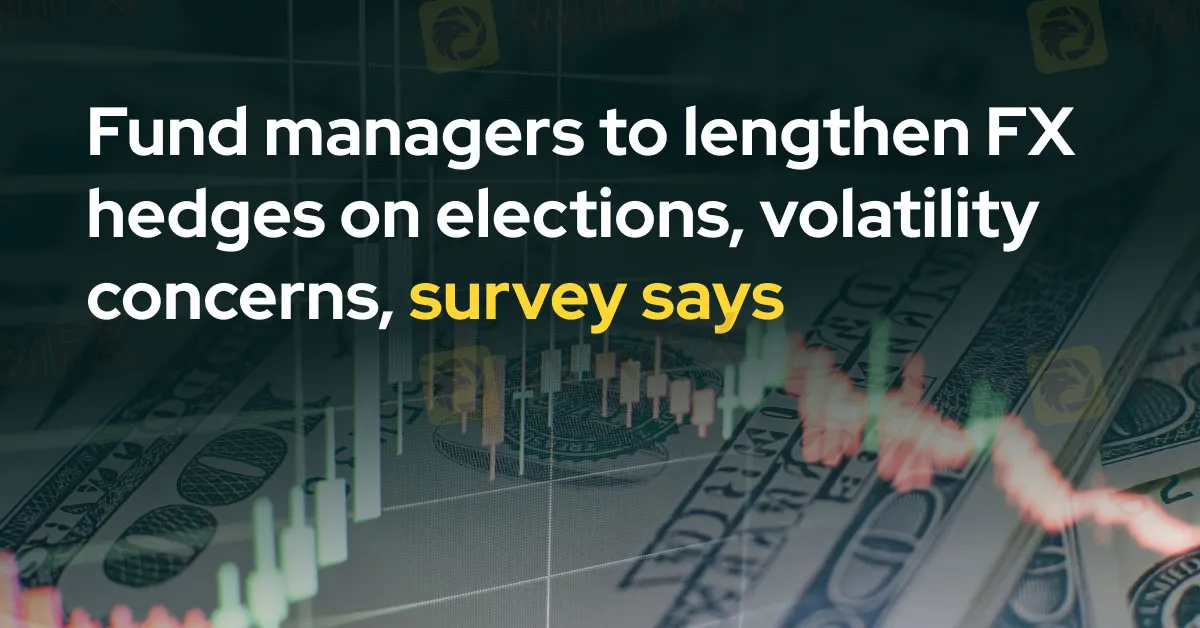简体中文
繁體中文
English
Pусский
日本語
ภาษาไทย
Tiếng Việt
Bahasa Indonesia
Español
हिन्दी
Filippiiniläinen
Français
Deutsch
Português
Türkçe
한국어
العربية
Fund managers to lengthen FX hedges on elections, volatility concerns, survey says
Abstract:Fund managers are looking to hedge more of their foreign exchange risk for longer to protect their returns, as concerns about volatility and the potential for unpredictable movements resulting from the upcoming U.S. elections grow.

Fund managers are looking to hedge more of their foreign exchange risk for longer to protect their returns, as concerns about volatility and the potential for unpredictable movements resulting from the upcoming U.S. elections grow.
Softer-than-expected U.S. jobs data last week, coupled with disappointing earnings from major tech firms, triggered a global sell-off in stocks and high-yielding currencies, with the greenback falling about 6% against the yen over the last five trading days.
A survey released on Wednesday found an increasing number of North American fund managers are planning to raise the tenor and the size of their hedges to shelter more of their currency exposures from losses and add more certainty to their portfolios.
The survey of 250 senior finance decision makers conducted by MillTechFX, the multi-dealer currency platform arm of specialist currency manager Millennium Global, found 65% of managers plan to lengthen the time in which they are shielded from FX volatility by moving to secure favorable exchange rates for their future transactions.
Meanwhile, 34% of managers expect to up their hedge ratios, a move that guards a greater portion of their exposures and portfolios from volatility.
“It's clear that fund managers are concerned about the potential FX ramifications, with many adopting a more proactive approach, protecting more of their currency exposures for longer as they seek to secure certainty in a climate that is anything but certain,” said Eric Huttman, chief executive officer at MillTechFX.
Managers can use long-term derivatives contracts such as FX forwards or options to secure favorable rates at which they prefer to trade in the future.
Geopolitics and diverging monetary policies between the U.S. and other central banks have been influencing investors' hedging activities this year.
Some 93% of managers have expressed concerns about dollar strength, with the survey finding that more than 80% of them saw their returns affected by dollar strength this year.
As a result, the number of managers hedging their forecastable currency risk rose to 79% this year, up 7 percentage points from 2023, according to the survey.
The dollar is currently up 1.6% against a basket of its major peers, shedding some of its gains, in part, over recession fears and the timing of interest rate cuts.

Disclaimer:
The views in this article only represent the author's personal views, and do not constitute investment advice on this platform. This platform does not guarantee the accuracy, completeness and timeliness of the information in the article, and will not be liable for any loss caused by the use of or reliance on the information in the article.
Read more

IG Group Set to Smash £1 billion Revenue Mark in FY2025
In the fierce competition of the fintech industry, IG Group, with its sharp market insight and continuous strategic upgrades, is projected to surpass the £1 billion revenue mark in FY25, injecting strong confidence into the sector.

Promises of Quick Riches Turned Nightmare: RM431,000 Lost in a Fake Scheme
A 67-year-old retiree from the private sector lost RM431,000 after falling victim to a fake investment scheme run by a fraud syndicate that promised quick and high profits.

Is Dupoin a “100% Scam Broker”?
Is Dupoin a “100% Scam Broker”? A trader shared the experience trading with Dupoin. In today’s article, we will offer you a comprehensive review of this broker so that you can have a close overall look at Dupoin.

WikiFX Broker Assessment Series | FXTRADING.com: Is It Trustworthy?
In this article, we will conduct a comprehensive examination of FXTRADING.com, delving into its key features, fees, safety measures, deposit and withdrawal options, trading platform, and customer service. WikiFX endeavours to provide you with the essential information required to make an informed decision about utilizing this platform.
WikiFX Broker
Latest News
Can these 10 Forex Brokers boost your money in 2025? Saxo, IB, eToro & More
Aurum Markets- Opportunity or Trap? Let's uncover
2025 FXPesa Latest Review
OANDA Japan Deletes Inactive Accounts, Urges Re-registration
M4Markets Review 2025: Is This Forex Broker a Scam or Trustworthy?
Stop Wasting Money on FX Courses! Learn Forex for Free- from Top Brokers
IG Group Set to Smash £1 billion Revenue Mark in FY2025
WikiFX Broker Assessment Series | IronFX: Is It Trustworthy?
Explore the Unique features of Zerodha, BOI & HDFC Bank
High Score, Fully Regulated: 3 Brokers You Can Trust in 2025
Currency Calculator


